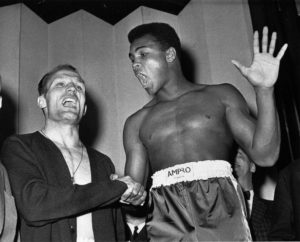Henry Cooper: Memories of a True Warrior & Gentleman!

By Donald “Braveheart” Stewart
One of the joys of looking back is memories. That is, if you can remember them accurately. Mind you, one of the wonderful things about having a bad memory is perhaps the creation of more pleasant experiences than the one you may have had. In boxing terms, I have had a fantastic trip down memory lane for Ringside Report over the last few months and I realized, just the other day, that one of the heavyweight boxers that has been seriously neglected is one that our memories of which we have a fantastic and better than believable memory – Henry Cooper.
Now we know that he downed Cassius Clay. We know that Clay’s corner got some time from playing with his glove and Angelo Dundee was extremely clever. For people of my generation we also know that he made a career out of advertising an after shave along with former English soccer legend, Kevin Keegan.
The problem is that it serves to largely ignore an amazing career that swept along the 50’s and 60’s, giving boxing fans treat after treat after treat. He was so loved that he received not just one honor from royalty but two and he remains the ONLY boxer to receive a knighthood form the Queen.
Born before the Second World War, in 1934 Cooper died just 5 years ago, in 2011, att age 76. The records will show that he fought professionally on 55 occasions. There were 40 wins and 14 losses with 1 draw but the story that records give us only show that someone had a long career. It doesn’t show the trials or the tribulations within that professional career.
It brought him the affection of the people as he was known as Our ‘Enry thanks to a powerful left hook – ‘Enry’s ‘Ammer. He held British, European and Commonwealth titles and was unsuccessful in trying to win world honors against Ali in 1966.
The fighters that Cooper beat included Brian London, Dick Richardson, Billy Walker and Roy Harris. OK now they don’t sound quite as impressive but at the time this was the top of a very impressive tree.
Equally impressive was that Cooper, a left hander, fought orthodox. His left hook was his greatest weapon but being hit and jabbed by that front dominant fist meant many fell from his style. It was a style that was honed in an amateur career that began in the shadow of the end of World War Two. As we recovered in Europe after that bloody conflict, Cooper was coming to the end of 84 contests in which he won 73. In 1952 Cooper was at the Olympics and though he did not medal he did have the distinction of being an Olympian.
His move into the professionals was not completely successful immediately as he was unable to win any of the 3 belts for which he can be lauded now at first attempt. Joe Bygraves beat him for the British, Ingemar Johansson for the European and Joe Erskine for both British and Commonwealth. As an example, to boxers of this generation Cooper stands tall as a man who dedicated his life to the sport and took things on the chin that promoters nowadays try to keep away from their boxers – learning from failure.
In 1959, over 15 rounds he took the British and Commonwealth belts from Brian London after which he could have been put up against Floyd Patterson for the world title. He had already been suggested as an opponent of Sonny Liston’s but his manager refused to put him in the same room as Liston, never mind a ring.
It all set him up for Cassius Clay in 1963. Cooper had no trainer, suggested he was so light that he put lead in his boots to make weight and in the 4th round there came the downing of Clay and the controversy that still rages today. Dundee acted illegally – that is sure as he used smelling salts – and the controversy led to spare gloves being kept at the side of each ring as Dundee claimed there was a tear in Clay’s glove; there was as he allegedly put it there. The future Ali, in typical fashion, claimed that Cooper hit him so hard that his ancestors in Africa felt it. It happened in Wembley Stadium and with Joshua/Klitschko due there in 2017 there can be no more fitting tribute to return to the place where possibly one of the biggest stories in heavyweight boxing in the UK happened in the 20th Century to have one of the biggest matches of the 21st.
His 1966 fight against Ali was at Arsenal Football stadium in Highbury and ended in the 6th round with the referee stopping the fight. It was Cooper’s only attempt at a world title but it was never going to rival the legendary 1963 contest.
Cooper’s career continued with a 4th round loss to Floyd Patterson and continued dominance domestically as he defended both his British and Commonwealth titles and then in 1968 got the European title by beating Karl MIldenberger – he then defended it twice.
His final professional fight, in 1971, against the newly emerging Joe Bugner was a loss that he could stomach because now we were seeing the changing of the guard. Bugner was to go on to some distinction, including fighting Ali himself (twice) and then passing the baton to Frank Bruno in 1987.
It was a distinctive career and a distinguished life and one we do well to remember as more than some tale of gloves and smelling salts.
[si-contact-form form=’2′]

